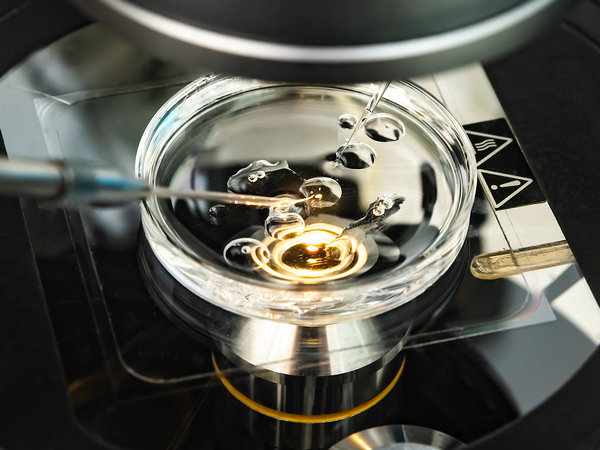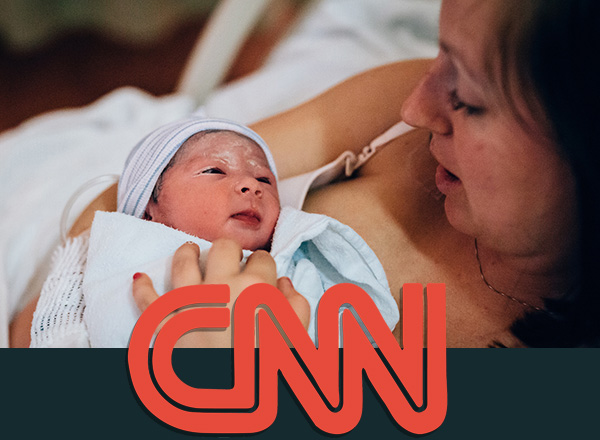In Vitro Maturation (IVM)
In vitro maturation is a safe and effective treatment offered in fertility centers for assisted reproduction. With IVM treatment, no hormone therapy is taken to produce large numbers of mature eggs at egg retrieval. Instead, immature oocytes (antral follicles) are retrieved from the woman's ovary and are matured in the lab for 24-48 hours.
How is IVM different from IVF?
IVF: Multiple hormonal injections are administered during the IVF procedure to encourage egg maturation while the eggs are still in the ovaries.
IVM: It is unnecessary to inject hormones into the mother following the IVM procedure because the eggs mature in the lab after we retrieve them from the ovaries.

Free Online Consultation with Dr Thanos Paraschos and his team
The main advantage of the IVM treatment
The main advantage of the in vitro maturation treatment compared to a conventional IVF cycle is the exclusion of hormonal stimulation drugs or synthetic follicle stimulating hormones before collection.
Therefore, side effects, particularly ovarian hyperstimulation syndrome (OHSS), and the associated medication costs are eliminated. The eggs are retrieved, and after they have matured, fertilization is performed. Then, fertilized eggs are transferred to the uterus as in conventional IVF treatment.
Combining Natural Cycle IVF with IVM
Natural cycle IVF involves retrieving only one egg from the ovary without using hormones. However, it is possible to induce ovulation, and all mature and non-mature eggs will be retrieved.
We can fertilize the mature eggs immediately. The immature eggs will mature in the laboratory (in vitro) until they are ready to be fertilized too. We will select the best embryos for transfer to the uterus.
Thus, by combining a natural cycle IVF with in vitro maturation (IVM), we increase the chances of pregnancy because we have more fertilized eggs without the woman having to take hormone-stimulating ovarian drugs.
Indications for in vitro maturation
- IVM treatment is initially considered for young women under 40 who have many follicles in their ovaries. Women with polycystic ovaries (PCO) or polycystic ovarian syndrome (PCOS) are the best candidates for this kind of treatment.
- In addition, in certain cases, IVM is also considered for women who have repeatedly produced poor-quality embryos or are poor responders to hormone therapy.
- Moreover, women undergoing stimulation for IVF may be advised to switch to IVM if they show signs of OHSS and have very high blood estrogen levels. The treatment change in the middle of the cycle is an effort to salvage the cycle and protect the patient's health.
- IVM treatment is also suitable for egg donors to eliminate the number of injections involved in the ovarian stimulation protocol and theoretically reduce the risk of ovarian cancer.
- It is indicated for women whose estrogen-dependent tumors prevent them from taking fertility medication.
- Last but not least, IVM followed by embryo freezing is the most effective option for women undergoing chemotherapy to preserve their fertility.
The procedure of IVM treatment
IVM treatment is easy and requires little time commitment compared to conventional IVF. The whole treatment consists of:
- Two or three ultrasounds, the first performed during day 2 or 3 of the patient's menstrual cycle and the second between days 6 and 9, to assess the endometrium and measure the size and number of growing follicles.
- An injection of HCG (Human Chorionic synthetic follicle stimulating hormone) to mature the eggs is given approximately 36 hours before egg retrieval, which is usually performed between days 9 to 14 of the cycle.
- Oocyte collection is performed under ultrasound guidance with a specially designed needle, and the entire procedure takes up to 30 to 40 minutes.
- The immature oocytes are cultured in maturation mediums for 24 to 48 hours.
- The matured oocytes are fertilized using the ICSI technique.
- Embryo transfer is usually performed 2 to 5 days after the immature oocyte collection. After egg retrieval and embryo transfer, medication treatment for endometrium support and implantation enhancement is required.
The success of this pioneering treatment depends mainly on the number of ovarian follicles and the number of immature oocytes retrieved. The success rate of this procedure can reach 35% - 40%, which is lower than that of conventional IVF.
IVM versus Cryopreservation for Cancer Patients
An increasing number of women have been diagnosed with invasive cancer over the past few years. Until recently, these women had few options in terms of preserving their fertility potential for the future. The most common alternative suggested in these women is cryopreservation of their embryos, which are produced in a conventional IVF cycle.
However, cryopreservation is not always applicable in all cases. There are several reasons why these women may not be able to choose cryopreservation of their embryos, including:
- Many women of reproductive age about to start chemo/radiotherapy may not have the time to undergo assisted reproductive technologies before starting treatment.
- Many women are diagnosed with cancer and do not have partners to fertilize eggs and create embryos for fertilization.
- Women with breast cancer, who have a hiatus between surgery and chemotherapy, are not usually good candidates for oocyte or embryo cryopreservation due to concerns of high estrogen levels.
- Several women are against embryo cryopreservation for religious or ethical reasons.
With the advancement of in vitro maturation (IVM) and oocyte cryopreservation, the number of options for these women has significantly increased.
With IVM, oocytes can be collected from the ovaries without ovarian stimulation and then matured in the laboratory. Until recently, the pregnancy rate associated with IVM and oocyte cryopreservation (egg freezing) was significantly lower than those seen with cryopreserved or fresh embryos.
However, recent studies have shown this is not the case anymore. Success rates for both IVM and oocyte cryopreservation are significant enough to argue that they are alternative options for all women wishing to preserve their fertility in the future.
Is In Vitro Maturation the proper fertility treatment for you?
Do not hesitate to contact the fertility specialist Dr Paraschos for an initial consultation free of charge!

